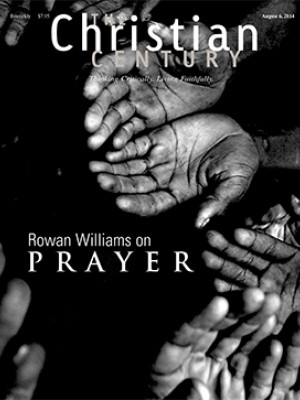Sunday, August 10, 2014: Romans 10:5-15
Our age is tremendously excited about the visual. Yet here is Paul, firm in the conviction that "faith comes from hearing, and hearing through the word of Christ."
When I went to college, it was still possible to major in rhetoric. I was not surprised to read Aristotle, Plato, and Cicero, but I was unprepared for the work of Russian psychologist Lev Semyonovich Vygotsky. Like most ministers, I have too many books. But our central room has just one bookcase, and Vygotsky has a place of honor there. That’s because he taught me about the relationship between speech and thought. People think in language, not pictures. The words people have are important, because words are the foundations of thought.
As a young person studying to enter the Presbyterian ministry, this made sense to me. God’s word to us is important precisely because it is the word of the Lord. It made an intuitive kind of sense given that my pastor at the time was always going on about the necessity of personal Bible study. If the Bible was necessary, clear, and sufficient for salvation, then Bible study was an activity of great importance—because it was the words and thought patterns of scripture that taught Christians how to think Christianly.
Read our latest issue or browse back issues.
Then a college chaplain gave me the task of preaching on Romans 10:5–15. Either he was very perceptive or he had a wicked sense of humor—perhaps both. It was suddenly my task to proclaim the word of faith.
Our age is tremendously excited by the visual. We have less time for words. Words, after all, can be spun, crafted, and used to obfuscate and prevaricate. There seems to be little trust in the printed word, maybe a little bit more in the spoken word. But more and more we depend on seeing for believing.
Yet here is Paul, absolutely firm in the conviction that “faith comes from hearing, and hearing through the word of Christ.” For the Bible—and here especially for Paul—the gospel and faith are not about seeing something so much as hearing something. It is in hearing the word of Christ that we are given the language to change our thinking. Or, to borrow from Paul again, in hearing the good news our minds are transformed by what we have heard.
Which puts the preacher in a difficult place, I think. All the years of my ministry I have heard that the spoken word is nearly dead as a form of communication, that pulpits and sermons have been rendered void of meaning. I have heard it argued that because pictures are worth a thousand words, a three-slide guided meditation would be much better than so much preaching.
There are calls for sensory engagement with congregations and for multisensory experiences for people searching for religious identity and meaning. Much of this is well intentioned. Art engages immediately. Smell, taste, touch, and sight all engage people in powerful ways. The church in which I first went to Sunday school had a particular smell of wax polish, Pine-Sol, and old Bibles. That combination of smells still sends me straight back to “Old First.” I remember searching the pages of my first Bible for artist Annie Vallotton’s stick figures—still powerful images in my own imagination.
And yet Paul is quite insistent: belief comes from hearing.
Occasionally I have been asked to preach at an ordination or installation for colleagues in ministry. I have been to large suburban congregations, smaller urban congregations, even to tiny rural congregations. I have had trouble finding parking downtown; I have also had to dodge a cow or two, unused to company on a Sunday afternoon. Yet on each occasion—at every ordination and installation I have ever attended—there has been one consistent theme: the Lord continues to speak. God’s word still has power. God’s word is spoken by faithful servants empowered for the work by the Holy Spirit. On each occasion it is the fact that God still speaks that is celebrated.
The word of Christ is a precious thing. Of all the prized assets given to us by God to steward, the word of God is the most valuable, because it is the word of the Lord. It comes to this: smell, taste, touch, and sight engage people in powerful and eventually Christian ways because they have the words, and therefore the capacity, to articulate their thoughts Christianly. Without the word there would be nothing to hear. With nothing to hear there would be nothing to believe.
The preacher’s task is still central to the work and worship of the Christian church. The task is essential because the only way that the Son of Man will find faith on the earth is if the church continues to proclaim the word of Christ.
Sometimes, during a lull in the noise that seems to surround so much of my work, I look at the slim volume by L. S. Vygotsky on my bookshelf and think about the link between speech and thought. This usually gets me thinking about the link between faith and hearing. As a Calvinist I was trained to be comfortable with defining faith as a “firm and certain knowledge.” Calvin’s definition works because he took Paul at his word. Faith comes from hearing—hearing the word of Christ.
Bible study and preaching remain vital because it is from the pages of scripture and from pulpits that Christians are taught the words of the Lord. It is in hearing those words that they are taught to think Christianly. In thinking Christianly they are transformed by the power of the Holy Spirit to be agents of transformation in the world.





